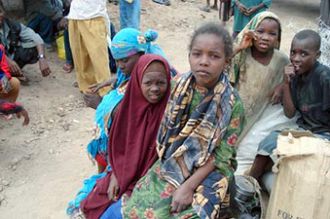Agencies voice alarm as Somali refugees suffer in crowded camps

picture: UNHCR
Source: Catholic Information Service Africa
More than 270,000 refugees who have fled war in Somalia are facing alarming shortages of food, water, and adequate shelter in severely overcrowded camps in northern Kenya, according to aid agencies.
Many are considering returning to the Somali war zone, according to the international medical humanitarian organization Médecins Sans Frontières (MSF).
MSF said on Monday that some 5,000 people arrive monthly in the Dagahaley, Ifo, and Hagadera camps located in the Kenyan border town of Dadaab, which are operated by the United Nations High Commission for Refugees (UNHCR).
Health and nutrition surveys carried out by MSF in April in the Dagahaley Camp, where the organization provides medical services, reveal high levels of acute malnutrition among a population already facing dwindling food aid rations.
"The situation is simply scandalous," said Joke Van Peteghem, MSF head of mission in Kenya. "These refugees have risked everything to escape the fighting in Somalia. Now some are telling us they would rather take their chances in Mogadishu than die slowly here. Aid agencies are present in the camps but are not able to meet the immense and rapidly growing needs of this war weary population. We need action now!"
Since Kenya has officially closed its border with Somalia, the registration process is disorganized and far too slow, medical screenings and distribution of basic supplies are not working properly, MSF said.
MSF called upon UNHCR, international donors, and the Kenyan government to urgently address the lack of assistance and protection provided to arriving refugees and the dire living conditions in the camps.
For 18 years people fleeing Somalia have settled in the Dadaab camps. In 2008, pushed by intense levels of violence in their country, more than 60,000 people arrived, swelling the combined camp populations to at least 270,000 people. Each camp can accommodate 30,000 people, but is home to
roughly three times that number.
"The camps are public health time bombs," said Donna Canali, a nurse who recently completed an assignment as MSF project coordinator in Dagahaley Camp. "The refugees, many of whom are already suffering from serious war-related injuries or illnesses, are packed together without the bare minimum to survive- water, food, shelter, and medical care. After all these people have endured, how can their most basic needs continue to be so woefully neglected?"















